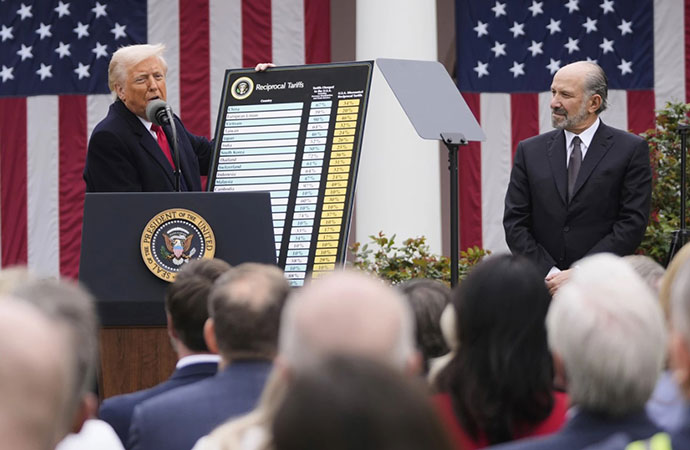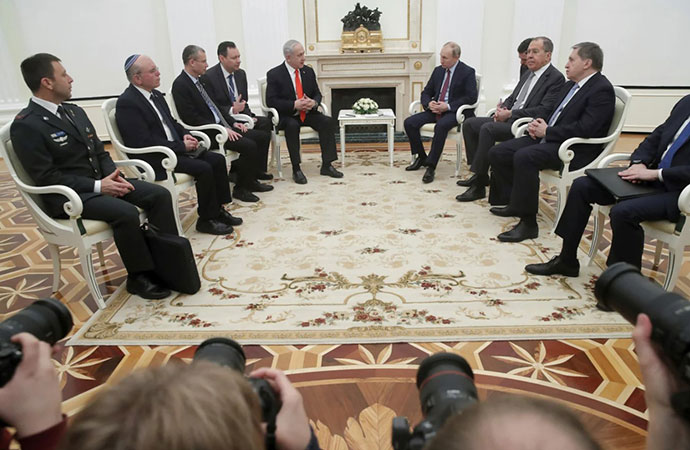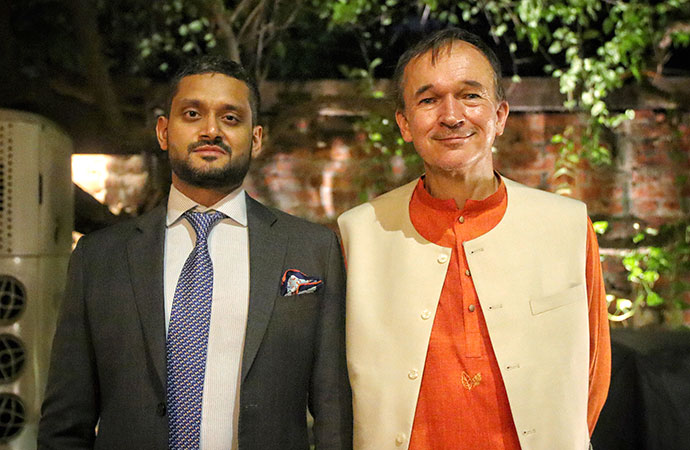Business

President Donald Trump speaks during an event to announce new tariffs in the Rose Garden at the White House, Wednesday, April 2,2025, in Washington, as Commerce Secretary Howard Lutnick listens. Photo: AP/UNB
U.S. President Donald Trump on April 2, 2025, announced a new 'Reciprocal Tariff' policy. This policy introduced a two-tiered tariff system: a flat 10% tariff on all imports effective April 5, and a set of elevated, country-specific 'reciprocal tariffs'-ranging between 25% and 50%-targeting nations with significant trade surpluses with the United States, initially slated for implementation on April 9.
Although the reciprocal tariffs were initially deferred for 90 days, President Trump later extended the suspension until August 1, 2025, to provide additional time for bilateral negotiations. On July 7, the U.S. administration issued updated tariff notifications to more than a dozen countries-including Japan, South Korea, Bangladesh, and Brazil-outlining revised reciprocal tariff rates scheduled to take effect on August
1.
According to the White House, the tariff plan is a key element of a broader economic strategy designed to address structural trade imbalances and incentivize foreign producers to shift manufacturing to the U.S. However, the move has sparked global concern. While some nations have expressed interest in negotiating bilateral trade terms to avoid steep tariffs, others-such as the European Union and Brazil-have warned of retaliatory measures, raising fears of a renewed escalation in global trade tensions and a potential weakening of the multilateral trading system under the World Trade Organization (WTO).
A Shock to the Global Economic Order
President Trump's "America First" trade policy shook the global economy and marked a significant turning point in the multilateral trading system. It fueled widespread uncertainty surrounding the global economic and trade order. The move posed serious threats to international supply chains, cross-border investment flows, and overall economic stability. Businesses and investors were left navigating an increasingly volatile and unpredictable trade environment, leading to heightened market turbulence and growing fears of an economic downturn or global shock.
Many nations viewed the U.S. tariffs as unjustified and harmful, citing significant economic repercussions and warning that such unilateral actions could destabilize the delicate balance of international cooperation. This policy serves as a stark reminder of the interconnectedness of global systems and the potential consequences of prioritizing short-term national interests over long-term multilateral stability.
This raised concerns about a potential global trade war, with far-reaching implications for supply chains, investment flows, and economic stability and fueled widespread uncertainty of the world economic and trading system.
Different countries have responded this challenge differently. Some countries opted for diplomatic engagement and negotiations, while others retaliated with counter-measures to protect their economies. In a retaliation to US escalated tariff, China has imposed retaliatory tariffs of up to 125% on U.S. goods. US further raised tariffs on Chinese imports to a staggering 245%, citing China's retaliatory actions as the reason. The European Union targeted iconic American exports like bourbon and motorcycles with tariffs worth billions of dollars. Similarly, Canada and Mexico introduced tariffs on U.S. steel, aluminum, and agricultural products. These actions have escalated trade tensions and disrupted global supply chains.
Establishing Multilateral Trading System
The United States realized the value of free trade, economic integration, and international cooperation as a result of the devastating effects of World War II and the severe economic downturn brought on by the Smoot-Hawley Tariff Act of 1930, which raised tariff significantly and fueled the Great Depression. This motivated the United States to trade liberalization and it took lead in establishing multilateral trading system to establish a legal framework for rule-based international trade.
The U.S. was instrumental in establishing the General Agreement on Tariffs and Trade (GATT) in 1947, laying the foundation for the modern multilateral trading system, and later championed the creation of the World Trade Organization (WTO) in 1995 to expand trade rules for services, intellectual property, and dispute resolution. These institutions promote free trade by reducing barriers and ensuring fair and predictable trade practices.
After World War II, the U.S. consistently advocated trade liberalization, globalization, free movement of goods, services and capital. President Truman was pivotal in establishing GATT, while President Kennedy advanced significant tariff reductions through the Kennedy Round. Ronald Reagan supported the Uruguay Round, leading to the WTO's creation, and signed the U.S.-Canada Free Trade Agreement, a precursor to NAFTA. Bill Clinton drove the establishment of NAFTA and the WTO, promoting globalization. George W. Bush further expanded free trade agreements with countries like Chile, Singapore, and Australia while supporting the Doha Round of WTO negotiations. Inspired by the U.S., many of its allies in Europe, North America, and Asia embraced trade liberalization and globalization, significantly contributing to the growth of international trade, economic prosperity, and poverty reduction worldwide.
MFN as a Cornerstone of the WTO
One of the most fundamental principles of the multilateral trading system is non-discrimination, which is embodied in the Most Favored Nation (MFN) rule. Under the MFN rule, WTO member countries are required to treat all trading partners equally. This means that if a country reduces tariffs or grants trade concessions to one trading partner, it must extend the same terms to all other WTO members. The origins of the MFN concept can be traced back to centuries, but it was formalized in modern trade agreements to promote fairness, predictability, and openness in global commerce.
The MFN principle became a foundational element of the GATT and later of the WTO, serving as a cornerstone of the global trading framework. The global rule-based multilateral trading system is a framework designed to facilitate international trade through agreed-upon rules and principles under its successor WTO. This principle fosters a level playing field, prevents discriminatory practices, and ensures that no country receives preferential treatment over others. It plays a critical role in maintaining trust and stability in international economic relations.
The Reciprocal Tariffs Violate WTO Rules
The U.S. Reciprocal Tariff policy, which prioritizes bilateral trade negotiations over multilateral cooperation and imposes differentiated tariffs on various countries, directly contradicts the rules and principles of the WTO and undermines its foundational values of non-discrimination and reciprocity. This policy violated the MFN principle, which obliges member countries to treat all trading partners equally by applying uniform tariff rates. By imposing country-specific tariffs based on perceived trade imbalances, the reciprocal tariff system created a discriminatory framework that fundamentally contravenes the MFN principle.
Moreover, WTO members commit to binding their tariffs at agreed-upon levels to ensure predictability and stability in global trade. By unilaterally adjusting tariffs outside these commitments, reciprocal tariffs bypass the WTO's rule, weakening the authority of the multilateral system.
Ignoring WTO Dispute Settlement Mechanisms
The United States has frequently criticized countries like China for implementing trade restrictions and non-tariff barriers, such as subsidies, import quotas, and regulatory hurdles, which can distort global trade. While these concerns may hold some validity, they do not justify unilateral measures like Trump's Reciprocal Tariff policy. Such disputes can and should be addressed through the WTO's Dispute Settlement Mechanism (DSM), a rules-based approach to resolving trade conflicts.
The WTO's DSM is specifically designed to handle trade disputes between member countries in a fair and transparent manner. It provides a platform for countries to challenge trade practices they believe violate WTO agreements through consultations, panel reviews, and, if necessary, appeals. This mechanism resolves disputes based on established international trade rules, offering a neutral and effective process to address issues such as non-tariff barriers without resorting to retaliatory measures.
Even though the United States may have legitimate concerns about trade restrictions, unilateral measures such as reciprocal tariffs are futile and undermining the multilateral trading system system's integrity.
Penalizing Small and Developing Economies
In addition to destabilizing the global trading system, Trump's reciprocal tariff also intensifies the economic challenges faced by developing countries. These countries are given some protections by multilateral frameworks like the WTO, including special provisions for Least Developed Countries (LDCs) and access to dispute resolution procedures. In bilateral settings, these safeguards are typically absent, leaving developing nations more vulnerable to exploitation and coercion.
Developing countries depend on stable trade relationships and access to global markets to export goods and attract foreign investment. However, Trump's reciprocal tariffs have introduced uncertainty and restricted market access for these nations. For example, Madagascar and Lesotho, two small and least-developed countries, faced tariffs as high as 47% and 50%, respectively, despite contributing less than 0.1% to the U.S. trade deficit. Similarly, Bangladesh, which also contributes minimally to the U.S. trade deficit, is subject to disproportionately high tariffs of 37%. This significantly undermines the competitiveness of its low-value, labor-intensive readymade garments in the U.S. market-a critical destination for its exports.
Developing countries are often at a severe disadvantage in bilateral negotiations due to their limited bargaining power, which has a negative effect on their terms of trade-the relative prices at which they exchange goods and services with other countries. These countries typically have smaller, less diversified economies that are heavily reliant on a few key exports-often raw materials, labor-intensive products, or agricultural products-and have limited bargaining power. In bilateral negotiations with larger and more developed economies like the U.S., they lack the economic leverage to demand favorable terms, which in turn adversely impacts their terms of trade. This asymmetry often forces developing countries to accept suboptimal trade agreements, such as reduced access to foreign markets or higher import tariffs on their goods.
Moreover, in bilateral negotiations, larger economies can impose policy-related conditions-such as stricter intellectual property laws, regulatory standards, or restrictions on subsidies. While stringent rules on labor or environmental standards are important in principle, they may significantly raise production costs, making their exports less competitive. The limited bargaining power of developing nations in bilateral negotiations erodes their ability to secure favorable trade terms, exacerbating economic inequalities and undermining their development prospects.
Weakening the Multilateral Trading System
Trump's reciprocal tariff policy marked a significant departure from the rule-based, multilateral trading system that has underpinned international economic relations since the end of World War II. By imposing blanket tariffs and adopting a country-specific approach based on perceived trade imbalances, the policy undermined established norms rooted in cooperation, non-discrimination, and adherence to WTO principles.
The multilateral trading system, founded on principles of fairness and collaboration, has long been a cornerstone of global economic stability. While the immediate concern centered on the risk of destabilizing international trade, limiting globalization, encouraging economic nationalism and protectionism, escalating a global trade war, and economic downturn, the broader and more alarming consequence is the gradual erosion of the multilateral trading framework.
Such a shift has implications far beyond trade. It even risks destabilizing the global economic and political order. The erosion of trust in multilateral institutions like the WTO can spill over into other organizations, undermining the credibility, legitimacy, and effectiveness of entities such as the United Nations. The weakening of the multilateral trading system thus presents a deeper risk: the fragmentation of the multilateral world order itself, jeopardizing the collective ability to tackle global challenges and maintain international cooperation.
Conclusion
Trade theory highlights the benefits of liberalization and globalization, demonstrating how economic interdependence fosters stability in international relations. By creating incentives for mutual cooperation, trade makes peaceful engagement more advantageous than hostility. To sustain these benefits, the global community must revitalize the WTO, strengthen its dispute resolution mechanisms, and ensure that trade remains a driver of inclusive and sustainable development. Without such efforts, the world risks reverting to economic fragmentation, unilateralism, and hegemonic trade practices.
To preserve the integrity of global trade, the multilateral framework must be upheld, ensuring that trade rules remain cohesive and resistant to fragmentation. A commitment to rule-based negotiations rather than unilateral actions is essential, fostering dialogue within WTO forums instead of resorting to retaliatory tariffs. Strengthening multilateral trade diplomacy will help address grievances and imbalances through cooperative mechanisms, reinforcing trust among nations. A key priority is revitalizing the WTO's Appellate Body and DSM to restore credibility in multilateral arbitration while enhancing transparency in global trade governance. Moreover, special and differential treatment for developing nations must be safeguarded, ensuring that Least Developed Countries (LDCs) and smaller economies retain preferential access to global markets. Before imposing reciprocal tariffs, impact assessments should be conducted to mitigate adverse effects on vulnerable economies, protecting trade stability and fostering inclusive economic growth.
Dr Golam Rasul is Chair of the Department of Economics at IUBAT.
E-mail: golam.grasul@gmail.com

























Leave a Comment
Recent Posts
Religion and Politics: A Toxic ...
At Dhaka University, cafeteria workers have been told not to wear shor ...
Enayetullah Khan joins AsiaNet ...
AsiaNet’s annual board meeting and forum was held in Singapore, ...
In a New York minute
Many leaders back a UN call to address challenges to ..
Defaulted loans at Non-Bank Financial Institutions ( ..
How the late Zubeen Garg embodied cultural affinitie ..